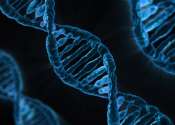'Jumping genes' help fungus kill salamanders
A fungus that infects salamanders contains multiple copies of the same "jumping genes", scientists have discovered.

A fungus that infects salamanders contains multiple copies of the same "jumping genes", scientists have discovered.
Evolution
Jan 4, 2023
0
228

In a new study, North Carolina State University researchers characterize a range of molecular tools to rewrite—not just edit—large chunks of an organism's DNA, based on CRISPR-Cas systems associated with selfish genetic ...
Biotechnology
Nov 21, 2022
0
119

They are considered "parasitic genes." Even though they comprise over half of human DNA, much remains to be learned about them. Now University of California, Irvine biologists offer new insights into these entities known ...
Molecular & Computational biology
Aug 23, 2022
0
173

An international research team has deciphered the mechanism by which the fungus Cryptococcus neoformans is resistant to fungus-specific drugs. It is a yeast-like fungus that can infect humans. Specific drugs, named antifungals, ...
Cell & Microbiology
Aug 3, 2022
0
47

You are probably familiar with the term that some people carry "a lot of extra baggage." Usually that term refers to that person's emotional history, but in genetics and our genomes, "extra baggage" can also describe the ...
Molecular & Computational biology
Mar 3, 2022
0
94

The protection of genome integrity of germ cells is essential for animal fertility. Researchers from the Grosshans group characterized a defense mechanism against selfish genetic elements in the C. elegans germline. They ...
Cell & Microbiology
Apr 14, 2021
0
65

In the same way that Lego pieces can be arranged in new ways to build a variety of structures, genetic elements can be mixed and matched to create new genes, according to new research.
Evolution
Feb 22, 2021
0
48

The capture of the first living Coelacanth, a mighty ocean predator, off the coast of South Africa caused quite a stir in 1938, 65 million years after its supposed extinction. It became known as a "living fossil" owing to ...
Evolution
Feb 9, 2021
5
6792

Transposons are foreign DNA elements capable of random insertion into the genome, an event that can be very dangerous for a cell. Their activity must be silenced to maintain genomic integrity, which is primarily achieved ...
Biotechnology
Jan 15, 2021
0
28

Deep inside your cells, DNA provides the instructions to produce proteins, the essential molecules that grow and maintain your body.
Cell & Microbiology
Nov 17, 2020
0
1720